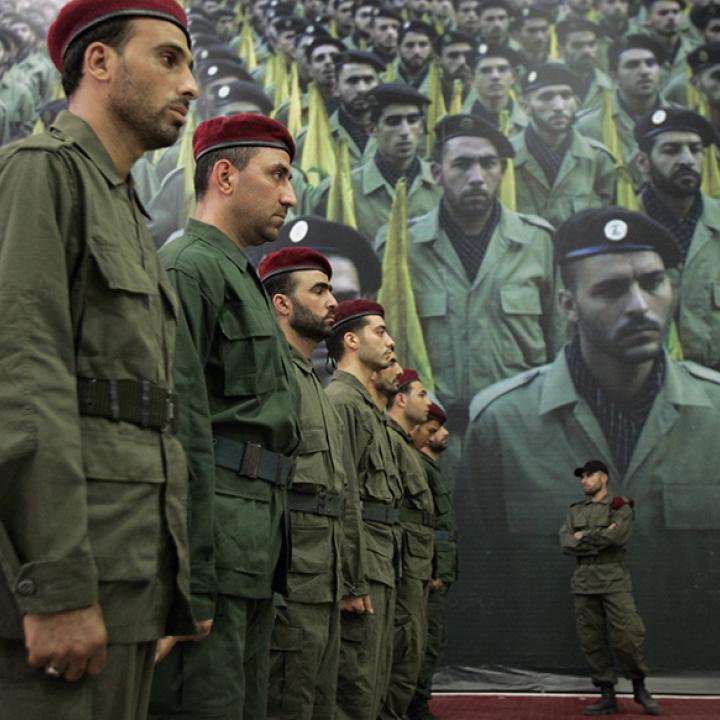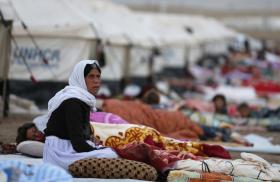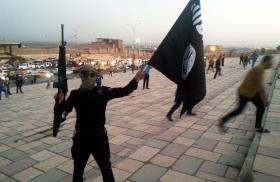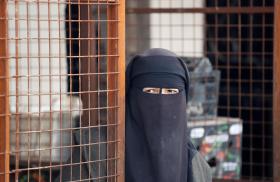
- Policy Analysis
- PolicyWatch 2879
Hezbollah's Terror Army: How to Prevent a Third Lebanon War

Part of a series: Counterterrorism Lecture Series
or see Part 1: U.S. Efforts against Terrorism Financing: A View from the Private Sector
Three veteran European military leaders discuss Hezbollah's escalating threat to regional stability and outline urgent steps for avoiding a destructive new conflict with Israel.
On October 25, Col. Richard Kemp, Gen. Lord Richard Dannatt, and Gen. Klaus Naumann addressed a Policy Forum at The Washington Institute as part of the long-running Stein Counterterrorism Lecture Series. Kemp is former commander of British forces in Afghanistan and led the international terrorism team at Britain's Joint Intelligence Committee. Dannatt is former chief of the general staff of the British Army. Naumann has served as chief of staff of the German Bundeswehr and chairman of the NATO Military Committee. All three participated in a High Level Military Group project that led to the publication of the recent report Hezbollah's Terror Army: How to Prevent a Third Lebanon War. The following is a rapporteur's summary of their remarks.
RICHARD KEMP
The West has a unique opportunity to prevent further wars between Hezbollah and Israel. Yet doing so would require many governments to change their instinctive reaction to Israel military operations.
Currently, the prospect of Hezbollah initiating another war seems like a high probability, especially given its status as Iran's main proxy against Israel, the United States, and their allies. The High Level Military Group has few doubts that once a war begins, Israel would feel compelled to respond with significant aggression, force, and speed. And while its operations would surely follow the laws of armed conflict, they would necessarily result in extensive civilian casualties, especially in southern Lebanon.
Hezbollah knows this and in fact hopes to provoke it -- the group is counting on a high casualty count to turn the international community against Israel, recognizing that many governments automatically isolate and even vilify the country whenever it defends itself against enemy attacks. Much like Hamas and similar groups, Hezbollah aims to garner enough support to put Israel on trial for war crimes. For this very reason, Israel is unlikely to consider a major preemptive campaign in Lebanon.
To change Hezbollah's calculus and avoid playing into the group's hands, Western governments should reconsider their reactions to Israel's justifiable military and counterterrorism operations -- and to the terrorist attacks that spur those operations in the first place. Unfortunately, European governments are often more concerned about appeasing Arab countries in such situations. This mindset will persist so long as officials view terrorism directed at Israel differently from terrorism directed at other countries.
RICHARD DANNATT
Hezbollah has made significant developments in its strategic concepts and capabilities since the 2006 Lebanon war, and understanding the resultant dangers is vital to assessing the likelihood of attack and the nature of Israel's inevitable counteroffensive. Regarding ground combat capabilities, Hezbollah has grown well beyond the terrorist or guerrilla category -- it is now closer to a standard military force, with a clear chain of command and infrastructure. Its numbers have increased immensely, up to an estimated 25,000 active fighters and 20,000 reserve personnel. Around 5,000 of the active troops have completed advanced training in Iran.
Meanwhile, its arsenal has expanded to more than 100,000 rockets and missiles, of which thousands have long-range capabilities up to 250 kilometers. Ground forces are now outfitted with AK-47s, night-vision goggles, advanced antitank weapons, and upgraded explosives skills. More recently, Hezbollah has integrated a new armor support unit complete with modern tanks. It also has hundreds of unmanned aerial vehicles, advanced air defense systems, coast-to-sea cruise missiles, and significant intelligence capabilities. Combined with the combat experience Hezbollah forces have gained in Syria, these advances will allow the group to carry out operations at the company or battalion level.
In addition, Hezbollah remains the most important piece in Iran's proxy warfare strategy. Therefore, if another conflict with Israel breaks out, Tehran would likely push its other terrorist proxies around the region to come to the group's defense.
Hezbollah's basic strategic concept consists of three related parts: terrorist activity, traditional military activity, and political activity. Among other things, this interplay means that the group conducts operations without regard to the laws of war despite resembling a conventional military. For example, it has shown no compunction about using civilians as cover for its personnel, purposefully manipulating noncombatants into becoming targets. Over time, the group has transformed most Shia villages in southern Lebanon into military assets that provide infrastructure, recruitment, storage, and access to underground tunnels designed for warfare.
The international community should therefore realize that Hezbollah has become a potent threat not just to Israel, but also to the Lebanese people. During the next war, the group will no doubt aim to weaken Israel's resolve and gain a tactical advantage by attacking civilians and critical infrastructure inside Israel, perhaps even seeking to capture and hold important territory in an effort to prove the credibility of its "resistance" stance to the Arab world. In response, Israel would surely launch a massive counteroffensive that would put the bunkered-in civilian population of southern Lebanon in grave danger.
Finally, while the High Level Military Group's latest report focuses on preventing a third war, one might argue that the first shots have already been fired, with both sides conducting low-profile operations of various sorts against each other. In that case, it would not take much to transition from a cool war to a hot one.
KLAUS NAUMANN
Given Hezbollah's improved military capabilities, its desire to target Israeli civilians, and its strategy of using Lebanese civilians as human shields, the next war would be decidedly worse than the previous one. If it breaks out, it could hold serious humanitarian consequences and put Western strategic interests in danger.
The West can still defuse this looming war or ameliorate its worst effects. To do so, the United States and Europe need to reevaluate their relationships with Lebanon and update their policies accordingly. Lebanon is no longer a friendly state with a terrorist group lurking at the margins. By this point, Hezbollah has managed to establish control over most of the country, leaving the government reliant on its presence and manipulating officials to neglect the people's interests for the sake of pursuing Iran's regional agenda. If the West fails to recognize that Lebanon is no longer distinct from Hezbollah, the danger will only grow.
Hezbollah is preparing another conflict with Israel for two main reasons. The first is nothing new: both the group and its Iranian patron oppose Israel's existence. The second reason stems from Hezbollah's recent legitimacy problem in Lebanon due to losses incurred in Syria. For now, this problem is likely restraining the group from attacking Israel, since its leaders may not want to start another costly war right away. At the same time, they would likely leap at the chance of a one-off attack if the opportunity arises to burnish their domestic credentials by doing so. Yet such a move could easily spur all-out war -- for example, if a miscalculation or break in the chain of command results in an attack that produces substantial Israeli civilian casualties.
The United States has already taken positive steps to prevent a third Lebanon war, such as recognizing the Iranian roots of the longstanding conflict and enacting sanctions against Tehran and Hezbollah. More immediate and firm action is required, however. The Trump administration needs to be forward thinking in this regard, mixing political, financial, and deterrent pressures on Hezbollah, the Lebanese government, and Iran. It should also state in unambiguous terms that Israel has the right to defend itself in the wake of Hezbollah attacks.
Similarly, European governments must do more to acknowledge and react to the reality of the situation. Most important, they should unequivocally designate the entirety of Hezbollah's organization as a terrorist entity, dispensing with the false distinction between its political and military activities.
International diplomacy must recognize the serious danger Hezbollah poses as well, especially with regard to the UN Interim Force in Lebanon. Neither UNIFIL nor the resolution authorizing its operations has been successful. The UN should therefore strengthen the force or reconsider its mandate, since it is not currently robust enough to be effective. Given the potential harm another war could bring to the Lebanese people, to Israel, and to European countries already reeling from refugee issues, the time to take more robust action is now.
This summary was prepared by Rachel Miller.








